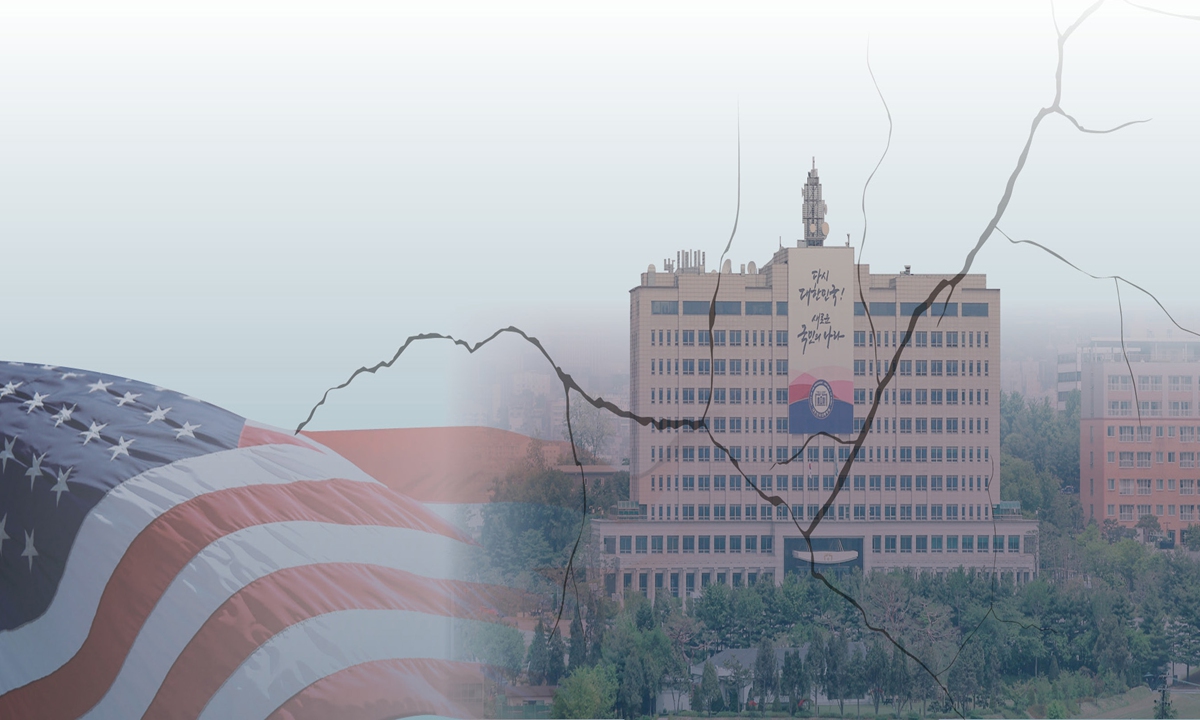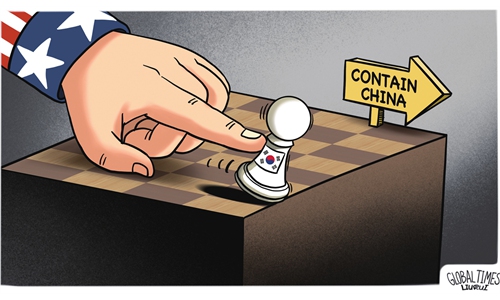
Yongsan Presidential Office, Seoul, South Korea Photos: VCG
Editor's Note:
China-South Korea relations are experiencing a downward trend recently as Seoul instigated a series of diplomatic disputes and displayed toughness toward China. Moon Chung-in (Moon), special advisor for former South Korean president Moon Jae-in, viewed the recent developments in bilateral ties as "unfortunate." In an interview with Global Times (GT) reporter Wang Wenwen, he talked about China-South Korea relations, South Korea's alliance with the US and strategic autonomy, and its role in preserving regional stability.
GT: How do you see the recent negative developments in China-South Korea ties?
Moon: It is unfortunate. Both countries need each other. A lot of people in South Korea argue that "security with the US, and economy with China." But we need close cooperation with China for both security and economy. China also needs cooperation with South Korea for regional stability and common prosperity. Several factors have negatively influenced uneasy relations between Beijing and Seoul. The strategic rivalry between the US and China, the nuclear issue on the Korean Peninsula, and excessive domestic politicization of the China issue have strained the bilateral relationship. The leadership in Seoul and Beijing should work hard to reverse the trend.
GT: Given the current pro-US posture of South Korea, do you think Seoul is consuming its diplomatic balance and losing strategic independence?
Moon: In the past, regardless of the conservative and progressive governments, South Korea tried to seek balanced diplomacy. While maintaining an alliance with the US, they wanted to strengthen their strategic cooperative partnership with China. But the current Yoon Suk-yeol government is giving more emphasis on the US precisely because the US is the sole guarantor of South Korea's security. Apart from security, President Yoon underscores shared common values such as freedom, democracy, and human rights. He also believes that South Korea has a lot to gain from the US in the economic domain. For those reasons, the Yoon government has given the impression of seeking a pro-American balancing against China.
However, Foreign Minister Park Jin recently mentioned that there is no reason for South Korea to go against China and that he would like to strengthen strategic communication with China. That sends a positive signal.
Despite such a gesture, however, the Yoon government has been betting on the US, while openly criticizing the previous government's strategic ambiguity posture that sought alliance with the US and strategic cooperative partnership with China simultaneously. Nevertheless, overemphasis on strategic certainty favoring the US alliance could backfire, alienating and even invoking China's hostile responses. This being the case, the Yoon government will have hard time in solving the North Korean nuclear problem as well as complicating its economic situation. I fully understand the Yoon government's pro-American stance, but its diplomacy needs to be more prudent and balanced.
GT: You mentioned Foreign Minister Park Jin's remarks. We notice that these remarks came after US Secretary of State Blinken's China visit. Is South Korea truly realizing the importance of China ties or following US steps?
Moon: Both are true. The Yoon government realizes the importance of robust ties with China, but simultaneously tends to see South Korea-China relations as a subset of overall US-China relations. The intensifying China-US strategic rivalry has driven the Yoon government to condition the nature and direction of Seoul-Beijing relations to the dynamics of Beijing-Washington ties. In this sense, the Yoon government is lacking strategic autonomy by following US steps. But such a move can be seen as a calculated compromise.
GT: What prevents South Korea from having more strategic autonomy?
Moon: I really don't think that the US has forced South Korea to give up its strategic autonomy. It is rather Seoul's voluntary choice. The Yoon government believes that by going along with the US, even at the expense of weakening its strategic autonomy, best serves South Korea's national interest. For President Yoon and his supporters, American conventional and extended deterrence involving nuclear umbrella is the surest way to safeguard our national security.
President Yoon has been extremely critical of the Moon Jae-in government's Korean peace process initiative that involves the process of the adoption of the end of war declaration and transformation of the armistice agreement into a peace regime. No matter how beneficial for peace and Seoul's strategic autonomy it might be, Yoon believes that such arrangement can undermine the ROK alliance with the US and its national security.
But let me point out that quite a large number of South Koreans support Moon's Korean Peninsula peace process initiative and oppose the Yoon's hardline policy.
GT: Are you saying that so long as South Korea maintains the alliance with the US, there is no chance for restoring strategic autonomy?
Moon: Realistically speaking, yes. An alliance with the US might be inevitable for South Korea and compromise of strategic autonomy unavoidable. However, an alliance cannot be the ultimate solution because it will entail a perpetual security dilemma. We should get away from such a trapping structure associated with the notion of collective defense based solely upon an alliance. In this regard, we might have to rethink about the notion of collective security embodied in the UN Charter.
Collective security is predicated on the concept of security community in which no enemies or threats are presumed. All countries are members of security community in which common, cooperative, and comprehensive security is widely shared. This idea is similar to that of Chinese President Xi Jinping's Global Security Initiative. South Korea alone cannot pursue it. There must be a regional-level approach to it through multilateral security cooperation.
GT: There have been reports and speculations about whether South Korea will join Quad. How do you see this possibility?
Moon: I understand the Yoon government once expressed his desire to join the Quad, but the US didn't respond to it. Apparently Japan does not seem to want South Korea to be part of the Quad, which is rather an exclusive minilateral arrangement. Thus, it seems very unlikely that South Korea will join the Quad. If South Korea joins it, its title should be changed. And the Quad is not a military alliance, but a minilateral cooperation mechanism for non-military issues such as economic, pandemic, emergency relief issues.
GT: Japan is in talks to open an NATO liaison office. How will it affect regional stability?
Moon: In the short term, I don't see any immediate impacts. But if NATO literally expands into the Indo-Pacific or Asia-Pacific region in the long and medium term, it will bear profound negative security implications. It will be seen as the global containment of continental forces such as China and Russia, reminiscent of the Cold War. NATO is designed for the North-Atlantic area. It should remain as such. Why should it extend into the Indo-Pacific or the Asia-Pacific region?
I also have some doubt on NATO's capability. Russian invasion of Ukraine has redefined its regional mission clearly. And its performance in Afghanistan and elsewhere has not been impressive. Its expansion, especially naval power projection, will also remind some Asians of "gun boat diplomacy" of the 19th century.
GT: What do you think of South Korea's role in preserving regional stability?
Moon: An alliance is one way of preserving security and stability on the Korean Peninsula. But in order to facilitate regional peace and stability, South Korea should be more active in promoting multilateral security cooperation focusing on common security, cooperative security, and comprehensive security. In addition, South Korea should play a leading role in strengthening China-Japan-South Korea trilateral cooperation. Seoul should continue to promote Japan-South Korea-US trilateral cooperation, but at the same time, it should pay attention to trilateral cooperation among China, Japan, and South Korea. In that way, South Korea can fulfill its diplomatic aim of "global pivot state." Furthermore, Seoul is currently housing the headquarters of the Trilateral Cooperation Secretariat.
GT: You attended a conference in Germany recently. You said the German leader can, when it comes to China, incorporate the opinions of various political groups into Germany's national security and foreign policy. You believed this approach has implications to South Korea. Can you elaborate?
Moon: President Yoon has shown very decisive leadership. Decisiveness is a good virtue of leadership. But democratic leadership should also demonstrate prudence, humbleness, and capability to muddle through conflicting interests and preferences. A President in a democratic society should carry out a fiduciary responsibility. South Korea has a presidential system in which the winner takes all. However, President Yoon won by a very narrow margin. He should keep in mind that constraint in formulating and conducting foreign and national security policy, because his decisions can affect the life and death of numerous people. Otherwise, his policy will lack legitimacy and public support.
GT: What do you think of Japan's insistence to dump the nuclear-contaminated wastewater despite opposition from many countries? What do you think of the South Korean government's attitude toward the IAEA report?
Moon: The South Korean government has not formally endorsed the IAEA report, but seems likely to endorse. However, opposition parties and civil society in South Korea have expressed their strong opposition to the dumping. Disposal of the nuclear-contaminated wastewater will continue to divide South Korea society through an acute politicization process.
But please keep in mind that the IAEA report is not the terminal and binding assessment that obligate neighboring countries to abide by it. Thus, it is nothing but the beginning of the long process. The Japanese government should continue to consult with neighboring countries about the dumping and to find mutually acceptable solutions.

